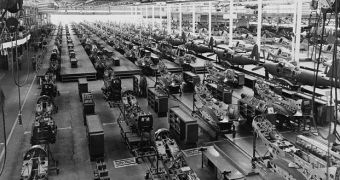People living in Western, more developed societies tend to be more aware of the environment. This is something that has been proven over and over again throughout the past few years, and the concern stems from the fact that it's a lot easier to care for anything with a full stomach. Companies and businesses in the developed world have proposed for a long time a scheme under which the things they use, ranging from tools to entire factories, are transmitted to the developed world once they are no longer of use. While this may seem commendable at first, experts believe it actually stops new, cleaner technologies from being implemented, AlphaGalileo reports.
As poorer nations take custody of these tools and machines, they put them to work immediately, without bothering to check if there are any other replacements for their technologies. As soon as the West upgrades to a new type of machine, all those of the old type get transferred to less fortunate nations, where they endure for decades. According to researchers at the University of Luxembourg (UL) and the Ecole Polytechnique, in Paris, France, this technology transfer is actually preventing the world from ridding itself of polluting production methods.
“We set forth to model how the decision to adopt older and dirtier technologies affects the relationship between economic development and pollution. If one assumes that older technologies are more environmentally unfriendly, then the decision of when to scrap these and what type of technology (i.e., used or new) to adopt [in their place] is likely to be an important determinant of the extent of pollution generation,” the team writes. One of the most common features of older technologies is that they are more labor-intensive, requiring more people to operate them on account of a smaller degree of automatization. Additionally, they also require more maintenance, as in more resources spent on them.
The European researchers also underline that technology transfers do nothing except help the developing world in the very short run. However, it became clear decades ago that the only solution for the poorest parts of the world to progress was to grow in a sustainable manner. This cannot be achieved with short-term measures, but with plans spanning additional decades. There is no immediate solution to African poverty and restlessness, except for patience and continued investment. In all, it is clear to analysts that the countries in the developed world have no real interest in helping Africa grow, and are fairly content with it being in the state that it is.

 14 DAY TRIAL //
14 DAY TRIAL //